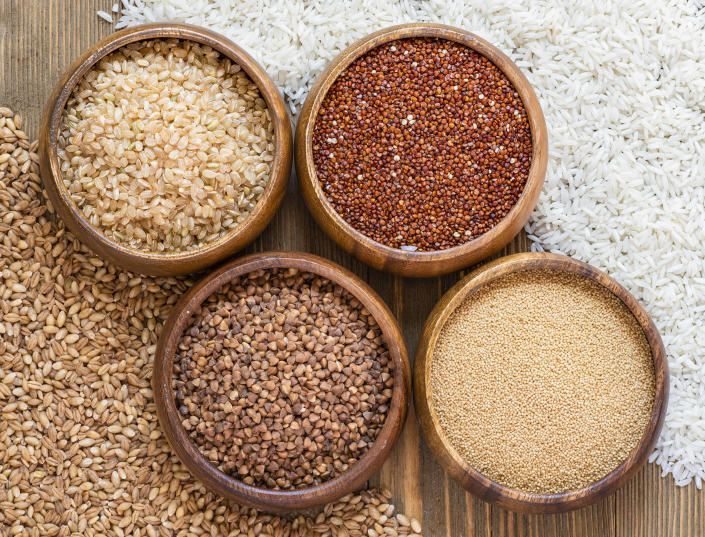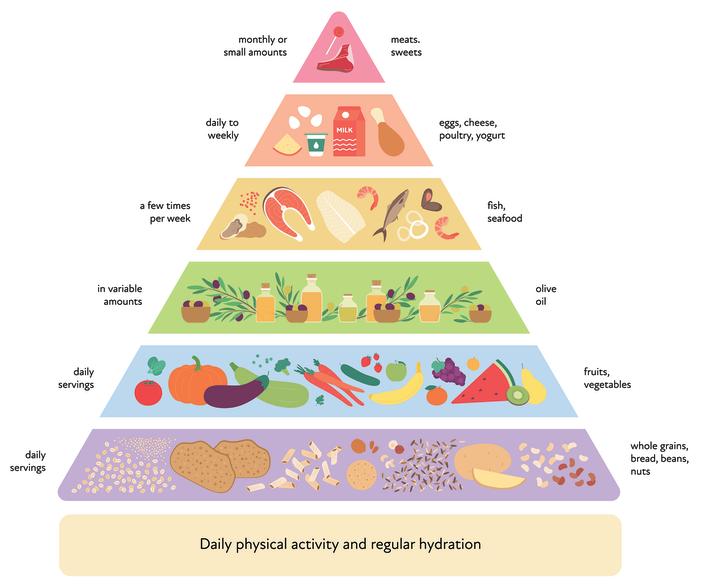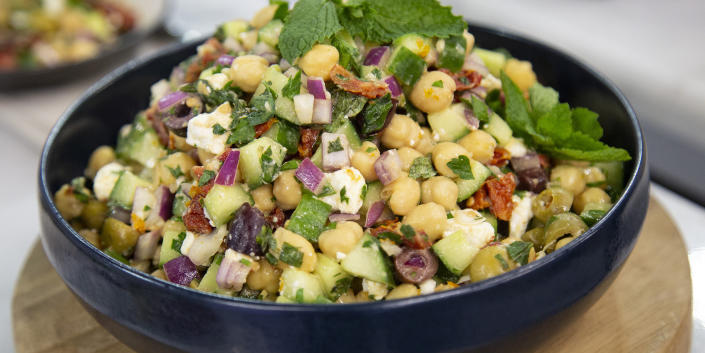The Mediterranean diet — sometimes called MD for short — consistently ranks at the top of overall best diets. That’s partially because the Mediterranean diet is an inclusive eating pattern chock full of healthy foods, not a restrictive plan.
The Mediterranean diet also tops the charts because it's full of affordable, accessible foods that are delicious — and that you probably already love to eat. Eating the Mediterranean diet feels like a pleasure, rather than a chore.

What is the Mediterranean diet?
The Mediterranean diet takes its name from the sea it’s named for and includes foods that are native to the countries bordering the Mediterranean — namely Greece, Italy, Spain, Morocco, Egypt and Lebanon.
Foods that come from the Mediterranean include many vegetables, fruits, whole grains and legumes. There is little sugar, sodium, highly processed foods, refined carbs, saturated fats and fatty or processed meats. Basically, the Mediterranean diet is amazing and effective because it naturally includes nutrient-dense plant-based foods and excludes unhealthy additives.
The fact that the MD is flexible and accessible and you have a basically perfect eating plan. It’s so good for you, in fact that in 1993 the nonprofit group Oldways partnered with the Harvard School of Public Health and the World Health Organization (WHO) to create the Mediterranean Diet Pyramid as a healthier alternative to the USDA food pyramid.
And — this is important — the Mediterranean diet is a pleasure to eat. “It celebrates the enjoyment of food,” Samantha Cassetty, a registered dietitian and weight-loss expert based in New York City and the coauthor of “Sugar Shock,” told TODAY.

Potential health benefits of the Mediterranean diet
The Mediterranean diet was developed because people who live in countries bordering the Mediterranean Sea tend to have lower levels of heart disease and live longer than Americans, and experts believe that their diet may get a lot of credit for that. Researchers became interested in Mediterranean-style eating in the 1950s. In 1992, it was introduced as a diet by the U.S.D.A. in order to help Americans lower their cholesterol.
Besides the general benefits of eating the MD, there are also many boons for specific segments of the population. Recent research suggests that pregnant women can lower their risk of developing high blood pressure by eating a Mediterranean diet. Another study shows that people at risk for metabolic disease could reduce their blood cholesterol and boost their digestive health by following a Mediterranean diet.
Plus, the Mediterranean diet has proven to be quite effective for people who want to manage — or lose — weight. One study analyzed the diets of more than 32,000 Italians over the course of 12 years and found an association between the Mediterranean diet and lower levels of weight gain and a lower increase in waist circumference.
In case that isn't enough to convince you, the "green" Mediterranean diet — which excludes red meat — has been shown to be extremely effective at reducing visceral fat. Visceral fat is dangerous for our health because it surrounds — and can damage — organs.
But you don’t have to have a health issue to adopt the Mediterranean diet. “It’s a healthy diet for just about everyone,” Karen Ansel, a New York-based registered dietitian and author of “Healing Superfoods for Anti-Aging, told TODAY. Experts agree that it can be among the best ways to lose weight. And it can work if you want to improve your overall health, even if you’re comfortable with your weight.
Foods to eat on the Mediterranean diet
Keep in mind that the Mediterranean diet represents a culture just as much as it does a cuisine, so it’s not about what’s allowed or avoided. Before it was a “diet,” MD was just the way that people who live near the Mediterranean ate — people who relied on seasonal foods and needed to mind their budgets and their family’s health at the same time, so it’s okay for you to floor their lead and include as many or few Mediterranean foods as you can.

That being said, these are the central foods in the Mediterranean diet:
-
Fish — especially salmon, sardines, and tuna
-
Fresh produce — use what’s locally grown to ensure freshness
-
Healthy fats — like nuts, avocado and olive oil
-
Lean dairy — like cheese, Greek yogurt and milk
-
Whole grains — try cereals, brown rice and whole-wheat pasta or ancient grains like quinoa, chia, amaranth, bulgar and buckwheat
-
Wine — in moderation
The Mediterranean diet food pyramid
The Mediterranean food pyramid offers a great way to understand how to think about your food instead of giving you rigid instructions. It’s organized by how often you should include a food category in your diet, with the foods you should include most often at the base and the foods you should include less often at the top.

Here’s the Mediterranean food pyramid, from base to top:
-
Fruits, vegetables, grains (mostly whole), olive oil, beans, nuts, legumes & seeds, herbs & spices: Consume these at every meal.
-
Fish and seafood: Eat at least twice a week.
-
Poultry, eggs, cheese, and yogurt: Eat in moderate amounts, daily to weekly, depending on the food.
-
Meats and sweets: Eat these only occasionally.

Foods to avoid on the Mediterranean diet
There are no totally forbidden foods on the Mediterranean diet. But you generally want to stick to eating foods with recognizable non-scientific names. A general rule-of-thumb is that most of the things you eat should not come in boxes.
Here are some foods to avoid on the Mediterranean diet:
-
Alcohol (besides wine)
-
Butter
-
Heavily processed food — like frozen meals with added sodium, soda, high-sugar beverages, candy and processed cheese
-
Processed red meats — like hot dogs, sausage, bacon and lunch meats
-
Refined grains — like white bread, white pasta or anything with white flour
-
Refined or processed oils — like soybean oil, safflower oil, corn oil, vegetable oil, canola oil and any hydrogenated or partially-hydrogenated oils
Mediterranean diet recipes
This article was originally published on TODAY.com
A beginner’s guide to the Mediterranean diet — what to eat and what to avoid - Yahoo News
Read More

No comments:
Post a Comment